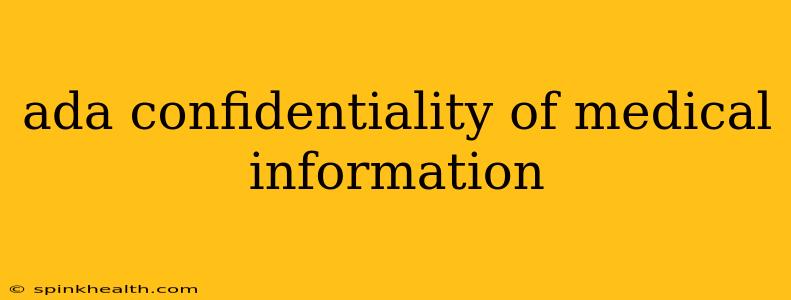The Americans with Disabilities Act (ADA) doesn't explicitly define "confidentiality of medical information" in the same way HIPAA does. However, the ADA's broad protections against discrimination based on disability significantly impact how medical information is handled, especially within the context of employment and public accommodations. Let's unravel this complex issue.
Imagine Sarah, a talented graphic designer with epilepsy. She's applying for a job at a thriving marketing agency. The ADA dictates that the agency cannot discriminate against her because of her epilepsy. This means they can't refuse to hire her simply based on her condition. But what about her medical information? That's where the nuance lies.
What the ADA Does Protect Regarding Medical Information:
The ADA prevents employers from requesting or requiring medical information before offering a job. They can only ask for such information after extending a conditional offer of employment, and only if the information is job-related and consistent with business necessity. This is crucial. An employer can't demand a full medical history; they can only request information directly relevant to performing the essential functions of the job.
For example, if the graphic design job involves working at heights, and epilepsy might pose a risk, the employer might need to ask specific questions relevant to Sarah's ability to safely perform that task. But they cannot demand access to her complete medical records.
What the ADA Doesn't Do:
It's crucial to understand that the ADA doesn't create a blanket confidentiality rule for medical information in the same way HIPAA (Health Insurance Portability and Accountability Act) does for protected health information (PHI). HIPAA governs the privacy and security of individually identifiable health information held by covered entities (healthcare providers, health plans, and healthcare clearinghouses). The ADA doesn't replace or supersede HIPAA.
The ADA focuses on preventing discrimination, not specifically regulating the handling of medical records. Therefore, separate laws and regulations concerning data privacy apply in parallel.
Does the ADA Require Employers to Keep Medical Information Confidential?
While the ADA doesn't explicitly mandate confidentiality in the same way as HIPAA, it implicitly requires employers to maintain the confidentiality of medical information obtained during the employment process. Disclosing such information without a legitimate business reason would be a violation of the ADA's anti-discrimination provisions. Employers are expected to treat medical information discreetly and only use it for legitimate, job-related purposes.
How Does the ADA Protect Medical Information in Public Accommodations?
The ADA's reach extends beyond employment. It also prohibits discrimination in public accommodations – places like restaurants, hotels, theaters, and transportation systems. In these settings, the ADA generally prevents businesses from demanding medical information or using it to exclude individuals with disabilities.
What Medical Information Can an Employer Ask For?
An employer can only request medical information relevant to the job and needed to determine if reasonable accommodations can be made. This request must come after a conditional job offer. The employer needs to show a legitimate business need for the information.
What are Reasonable Accommodations Under the ADA?
Reasonable accommodations are modifications or adjustments to the work environment or job tasks that enable a person with a disability to perform the essential functions of their job. These can include things like modified work schedules, assistive devices, or job restructuring. The employer has an obligation to engage in an interactive process with the employee to determine appropriate accommodations.
The ADA's protection of individuals with disabilities extends to the handling of their medical information. While it doesn't replicate HIPAA's stringent privacy regulations, it establishes a strong framework to prevent discriminatory practices based on a person's medical status, demanding responsible and confidential handling of sensitive information in both employment and public settings. If you have specific concerns, consulting with an employment lawyer or disability rights organization is always advisable.

